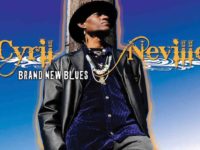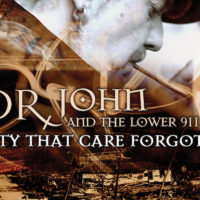Today marks the seventh anniversary of the landfall of Hurricane Katrina, an event that touched off the costliest natural disaster in U.S. history. Although “7” isn’t a landmark anniversary like, say, 1, 5 , 10 or 25, it’s impossible to erase this tragedy from my consciousness.
Especially when there’s yet another hurricane bearing down on the Gulf Coast as I type this, with its sights set squarely on New Orleans. My hope is that by the time you read this, the storm will have proven to be as underwhelming as Katrina was overwhelming.
But even if by tonight southern Louisiana and Mississippi are collectively breathing a sigh of relief, that won’t erase the destruction and sorrow of 2005. And every time I reflect long enough on the grief that cyclone and the aftermath had caused, my mind’s jukebox inevitably cues up that Randy Newman song, “Louisiana 1927.” Not the original version sung by its composer, mind you, but the later one rendered so magnificently by New Orleans son Aaron Neville.
I think I like Neville’s version better not just because Neville can croon like nobody’s business, but also because he injects just the right cadence, the right emotion, into the song.
With the extra emotional weight the song now carries, that means everything, now. It was the same song playing on the mental jukebox about five years ago when I originally jotted down my personal thoughts on it, reprinted here:
Randy Newman, a good ol’ boy from New Orleans, La., has been thought of as a national treasure by many, and for good reason. From “My Old Kentucky Home” to “I Love L.A.,” Newman’s deft mixture of Broadway show-tunes and modern pop makes him the closest thing to a modern-day Cole Porter of the late twentieth century. The carefully constructed melodies and the lush arrangements that sometimes accompany sometimes belie some mordant lyrics that don’t sugar coat at all when Randy is feeling, well, randy.
Followers of Top 40 back in 1977 remember how stinging Newman’s lyrics can be when his fluke hit “Short People” caused such an uproar as people missed the point of the song being a sarcastic denunciation of bigotry.
About three years earlier, Newman was at perhaps his most savage best with the Southern-themed Good Old Boys. In the middle of that classic collection is a song about the Great Mississippi Flood of 1927, which devastated much of the middle-to-lower Mississippi River region, with levee breaks overwhelming towns and destroying crops.
Newman’s account of that event and how it affected the Bayou State sounds straightforward, but given his penchant for aiming at contemporary targets, you have to wonder if he was really just giving us a history lesson or was there a larger message contained. The refrain provides a hint of the latter, whereby the state was and will always be treated as a stepchild of the Federal Government:
Louisiana, Louisiana
They’re tryin’ to wash us away
They’re tryin’ to wash us away
Regardless, it’s a beautiful tune even if it’s a rewrite of “Sail Away,” and the lyrics pair with a downcast, rich melody make this a great tune that provides ample demonstration to most of Newman’s strengths. Imagine how much better this song is then someone who can really sing is covering it.
Enter Aaron Neville.
In 1991, bolstered by the strength of the Neville Brothers’ Yellow Moon and also the success of his duets with Linda Ronstadt, Neville put out a solo record Warm Your Heart. It’s a good but not great album; however it kicks off marvelously with “Louisiana, 1927.” Being from New Orleans itself and having some savvy in picking tunes to cover, this choice makes a lot of sense.
The string-heavy arrangements of the original are here, and a swelling chorus is added for further weight. As for Neville’s lead vocal, it needs no comment except to state that it’s his usual outstanding fare; they don’t call him “The Voice” for nothing.
I listened to this and all the other songs from Warm Your Heart back when it was new, then put it away for about fifteen years until Hurricane Katrina struck the middle Gulf Coast. The tragedy called to mind this song about levees breaking and how it seemed like someone or something was trying again to wash away Louisiana. The relevant poignancy of this tragic event turned the song into something even more for me and couldn’t get it out of my mind for many days after.
Eventually, I did move on to other songs and other worries. But every August 29 (like last Wednesday), thoughts turn again to this song. And Aaron Neville’s golden throat delivering the goods.
Here’s a look back at our past thoughts on Hurricane Katrina and the music either inspired by that tragic event, or retroactively became connected to it. Click through the titles for complete reviews …
U2/Green Day, “The Saints Are Coming”: “The group of fans around me, at the sound of this deft reworking, surged out of their seats — like a hymn had raised them. I was, already, overwhelmed.”
Bryan Lee – Katrina Was Her Name: Lee sings of the devastation in plain terms so that no one listening to this song many years from now will forget what happened and when it happened.
The Subdudes – Street Symphony: The Subdudes greet this grim scene with all the emotions felt by most of the victims: anger, sadness, but also hope and faith.
James Blood Ulmer – Bad Blood In The City; The Piety Street Sessions: The best blues draw heavily on tradition while speaking at a gut level to the concerns and conditions of the here and now. Ulmer stepped up to the plate and delivered just that with this album. Blood may not be from New Orleans, but he proved here to be a true New Orleanian at heart.
Preservation Hall Jazz Band – Made in New Orleans: The Hurricane Sessions: They put out the perfect Mardi Gras record for the post-Katrina era. It acknowledges everything that came before, even while leading the way into happier times.
Ted Hearne – Katrina Ballads: Hearne brings back all of the tragedy and all of the surrealism inherent in such an epic event. Written for an ensemble of eleven musicians (piano, horns, woodwinds, strings, electric guitar, bass, and drums) and five voices, the work uses as source material many of the words we came to identify with Katrina.
Andrew Lamb Trio – New Orleans Suite: Recorded a scant three weeks after Katrina wrecked the Crescent City, New Orleans Suite is music that literally lives in the moment, in the immediate, confused and heartbreaking aftermath of the storm.
The New Orleans Social Club – Sing Me Back Home: The majority of songs here were covers, but Katrina added a new relevancy and frequently a sense of urgency that is unmistakable both for the longing of things loved and lost and an undeniable anger at those slow to respond. This is what New Orleans sounds like in the best of times — and the worst of times: That is to say, pretty damn good.
Peter Novelli with Dr. John, “Since the Hurricane”: Half a decade later, Hurricane Katrina still has this devastating power to inspire, as heard on Peter Novelli’s 2011 self-titled release. Witness this song, which provides an emotional crest despite appearing in advance of a fascinating, star-studded six-track tribute to Slim Harpo.
Fred’s Country Fried Rock: Powder Mill, “The Devil in New Orleans”: The tune follows in a great tradition of storytelling songs, offering up a heart-rending story of a family that fled New Orleans after Hurricane Katrina and ended up in Memphis, where things didn’t get any better for them. The acoustic version puts the hopelessness and despair of the story on full display. The electric version puts a Southern rock groove behind it and gives it an angry edge.
[amazon_enhanced asin=”B000W03KA0″ /] [amazon_enhanced asin=”B000002GJK” /] [amazon_enhanced asin=”B00003XACM” /] [amazon_enhanced asin=”B000065DWH” /] [amazon_enhanced asin=”B000088E7Y” /]
- Ches Smith Quartet – ‘Clone Row’ (2025) - May 30, 2025
- James Brandon Lewis Quartet – ‘Abstraction Is Deliverance’ (2025) - May 27, 2025
- Soft Machine – ‘Drop’ (1971, 2025 remaster) - May 21, 2025





All of us who experienced Katrina have a story to tell. I remember mine here and what it taught me:
http://www.themommypsychologist.com/2012/08/29/remembering-katrina/